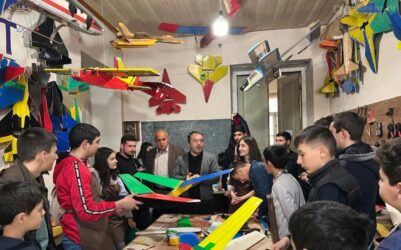ResponDrone partners continue to forge ahead with attending first responder training and exercises
October 15, 2020
Despite the current global limitations and various degrees of lockdown across Europe due to the COVID-19 pandemic, ResponDrone partners continue to invest efforts in promoting the project, showcasing its value to first responders, while both attending training events and engaging in preparations for future demos and drills.
ResponDrone invited to Bavarian Red Cross training
In early September, the Bavarian Red Cross (BRK) organized a crisis situation seminar and exercise for end users in Dreitannenlift, near Haselbach, Northern Bavaria. The main objective was to drill the coordination between various first-responder organizations and emergency services, using multiple airborne Unmanned Aerial Vehicles (UAVs) in a crisis situation.
The seminar entitled ‘Use of Drones in Civil Protection’ was led by Mr. Uwe Kippnich, Coordinator of Security Research and Applied Telematics at the Bavarian Red Cross Headquarters, and a member of the ResponDrone Project Advisory Board (PAB). The ResponDrone project coordinators, Max Friedrich and Joonas Lieb from DLR, the German Aerospace Center, were invited to attend, lending considerable weight to the project’s value as a leading platform providing state-of-the-art situation awareness capabilities to First Responders (FR).

The exercise scenario was a Search and Rescue (SAR) operation, during which a total of four independent UAVs remained simultaneously airborne in order to enhance the situation awareness of the FR teams on the ground via Electro-Optical (EO) as well as Infra-Red (IR) cameras.
The footage was streamed live to the control center on the ground, where a payload operator is able to instantaneously analyze the video stream.

Often, in situations of natural disaster or SAR missions, when first called out, the emergency services lack precise data regarding the specific nature and actual scope of the scenario on site. “There is initial information from the callers, after which we can alert the appropriate forces,” according to Thomas Schlereth, Jürgen Russ and Carina Barthel from the emergency control center.
The ResponDrone system aims to provide both, the rescue forces on site and the control center, access to the data generated via an app. With this information it is then possible to request additional personnel or alternatively to dispatch those FR personnel who are not required on site to other locations. The ability to supply real-time data to the FR units is precisely what could be improved by the use of UAVs, ultimately assisting in the overriding effort to save lives.
UAVs are also a leading tool to considerably improve FR capabilities when searching for missing persons. In the past, searches for missing persons were based entirely on a human presence on the ground (fire brigade, mountain rescue services, rapid response units and rescue dogs).
A UAV equipped with a thermal imaging camera can not only track down missing persons, but by hovering above the spot it can flash to show the rescue workers the way. They can then locate the scene of action on the screen and by precision coordinates can conduct a rapid rescue operation. The seminar participants were unanimous in their conclusion that UAVs represent a quantum leap forward in such operations.

During the seminar, the participants also learned how the various drones are flown and which flight safety guidelines must be observed.
The First Responder participants at the seminar were eager to learn much more about the ResponDrone project, especially as one of the key advantages of the ResponDrone platform is to facilitate the use of multiple UAVs controlled by one ground station. Further cooperation with such leading FR entities, especially with the BRK and Mr. Kippnich as ResponDrone PAB member, is planned to take place in the future.
ResponDrone team members meet in Corsica
During the first week of October 2020, several ResponDrone partners met at Ville de Corte (Cità di Corti) in Corsica to discuss the technical preparations for the upcoming first responder training exercise in autumn2021.
The ResponDrone team also visited different sites in the area for the upcoming full-scale demonstration, which will be the first live test of the situation awareness system developed by ResponDrone for first responders in emergency situations.
The key activities at the meeting included:
- A visit to the small airport at Corte to reach a decision on selecting the most appropriate site for the command force that will manage the demo next year and the preferred site for takeoff and landing point for the unmanned aerial vehicles (UAVs) provided by Alpha Unmanned Systems.
- The team members also engaged in an effort to check the flood zone, the forest fire zone and the location for the hostage search rescue mission components to be simulated during the upcoming training exercise.
- The project’s technical personnel also attended in order to check the connectivity options for handling all the communications at the demonstration, including the mobile and internet networks of the various providers in Corsica.




